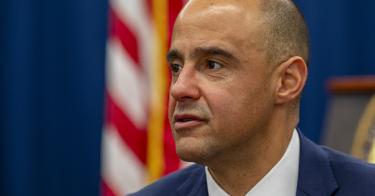The legacy of Matt Graves, the former U.S. attorney for the District of Columbia, is now coming into focus, and it’s not pretty.
In April, I reported in these pages that from 2018 to 2022, only 1.7% of people arrested on charges of carrying a pistol without a license in the District were sentenced to prison.
Now we have the 2023-2024 data from the District of Columbia Sentencing Commission, which shows that during the last two years of Mr. Graves’ tenure, a meager 3% of adults arrested on charges of carrying a pistol without a license were sentenced to prison.
That abysmal data point exemplifies his stint as the District’s top prosecutor and indicates the herculean task for interim U.S. Attorney Jeanine Pirro.
When he was sworn into office in November 2021, Mr. Graves had served as an assistant U.S. attorney in the District for almost 10 years before entering private practice in 2016. You would think he would know how to be an effective prosecutor.
>>> Why D.C. Remains One of the Nation’s Most Dangerous Cities
By October 2023, two years into the job, Mr. Graves was feeling the political heat. Crime rates had exploded on his watch. Homicides, armed carjackings, robberies and gun crimes were all up. Bodies were piling up in the morgue, and a series of high-profile politicos were victims of violent crime.
In February of that year, Rep. Angie Craig of Minnesota was viciously assaulted in the elevator of her D.C. apartment by a career felon. That April, Phillip Todd, a staffer for Sen. Rand Paul of Kentucky, was stabbed in the head by a recidivist who had been released from prison a day earlier. That October, Rep. Henry Cuellar of Texas was carjacked by three armed men in the Navy Yard district.
Fortunately, each one survived.
The same could not be said for Mike Gill, a married father of three who had worked at the U.S. Commodity Futures Trading Commission during President Trump’s first term. Gill was fatally shot in an attempted carjacking in early 2024.
Early in his tenure, Mr. Graves dissolved the community prosecution unit, which held hundreds of community meetings across the city, listened to community members and was the public face of the office.
The number of weekly carjackings averaged in the low single digits during the first Trump administration. Yet under Mr. Graves’ hands-off approach, the number exploded into the double digits, up to 43 the week of June 11, 2023.
Under Mr. Graves’ tenure, the District had more than 2,000 carjackings, 75% of which involved guns. Most were perpetrated by 16-year-olds, followed by 15-year-olds and 17-year-olds.
Under D.C. law, juveniles can be charged in the D.C. Superior Court as adults if the U.S. attorney’s office charges them with certain enumerated violent offenses, including armed carjacking, murder, robbery while armed and the like.
From 2013 to 2023, 176 juveniles accused of committing 206 offenses were charged as adults, about 16 annually.
In the seven years before Mr. Graves took office, an average of 22.7 juveniles were charged as adults annually. Under his kids-are-just-kids approach, an average of six juveniles were charged as adults from 2021 to 2023. The data for 2024 is not yet available.
Homicides, which averaged 134 annually for a decade ending in 2020, mushroomed to 226 in 2021, dropped to 203 in 2022, spiked to 274 in 2023 and waned to 187 in 2024, for a cumulative average of 222 for the four years of the Biden administration. Mr. Graves’ tenure was three years, and the average annual number of homicides on his watch was 221.
Today, thanks to the actions of interim U.S. Attorneys Pirro and Ed Martin, the numbers have returned to levels before the Biden administration.
Aware that the crime spike was largely a result of the D.C. Council’s underfunding of the police and Mr. Graves’ hands-off approach, the House Judiciary subcommittee on crime held an Oct. 12, 2023, hearing titled “Victims of Violent Crime in the District of Columbia.”
>>> Quantifying and Remedying Overcriminalization in Federal Law
I was a witness, along with D.C. Police Union Chairman Gregg Pemberton, two victims of violent crime and two other witnesses. I testified about five main reasons for the unacceptably high crime rate, including the U.S. attorney’s office policies, practices and personnel selection criteria that undermined public safety.
I noted that the U.S. attorney’s office, where I used to be an assistant U.S. attorney, had a 67% declination rate (the rate at which prosecutors declined to file charges presented to them by law enforcement authorities), compared with the San Diego district attorney’s office, which had a 22.6% declination rate for the past 20 years in more than 500,000 cases.
Both offices had 330 prosecutors, but Mr. Graves’ office had one prosecutor for every 2,035 residents and the San Diego office had one prosecutor for every 9,927 residents of the county. The D.C. office’s ridiculously high declination rate wasn’t a resource issue; it was a competency and leadership issue.
A week later, Mr. Graves held a press conference about the crime problem in the city and said, “I don’t focus on the criticism.” No one believed him. He blamed his office’s high declination rate on the D.C. Court of Appeals, which he said issued rulings that made it harder to prove cases.
If that was the entire reason for the high declination rate, why did the office’s declination rate drop in fiscal year 2023 to 56.3% and even further in fiscal year 2024 to 42.7%? Public pressure to start doing his job is why.
Think about this: Mr. Graves’ average declination rate was 55.3%, compared with 35.5% during the 10 years before he took office.
That’s the legacy of Matt Graves, who will go down in history as the worst chief prosecutor in the District in decades because of his abysmal track record in keeping our city safe and because of his false, misleading and downright insulting excuses for not doing his job.
This piece originally appeared in The Washington Times




